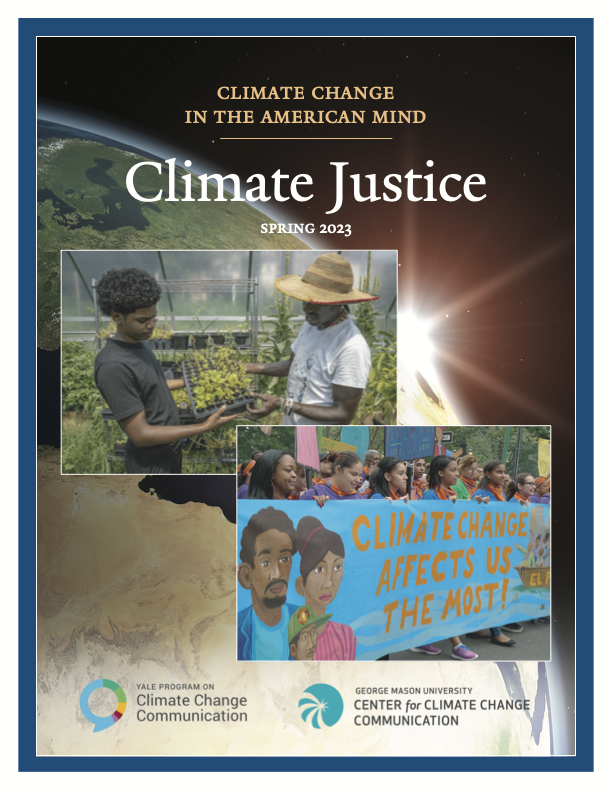Report · Sep 12, 2023
Climate Change in the American Mind: Climate Justice, Spring 2023
By Jennifer Carman, Matthew Ballew, Danning (Leilani) Lu, Anthony Leiserowitz, Edward Maibach, Seth Rosenthal, John Kotcher, Emily Goddard, Joshua Low, Jennifer Marlon, Marija Verner, Sanguk Lee, Teresa Myers, Matthew Goldberg, Nicholas Badullovich, Tracy Mason, Andrea Aguilar, Sha Merirei Ongelungel, Karina Sahlin, Cristian Sanchez, Irene Burga, Mark Magaña, Saad Amer, Romona Taylor Williams, Montana Burgess, Grace McRae, Makeda Fekede, Manuel Salgado, Annika Larson, Kristin Barendregt-Ludwig, Michel Gelobter and Gerald Torres
Filed under: Beliefs & Attitudes
Report Summary
This report is based on findings from a nationally representative survey – Climate Change in the American Mind – conducted jointly by the Yale Program on Climate Change Communication and the George Mason University Center for Climate Change Communication. Interview dates: April 18 – May 1, 2023. Interviews: 1,011 adults (18+), 861 of whom are registered to vote. Average margin of error for both all adults and registered voters: +/- 3 percentage points at the 95% confidence level. The research was funded by the Schmidt Family Foundation, the U.S. Energy Foundation, the MacArthur Foundation, the Heising-Simons Foundation, and the Grantham Foundation.
This report focuses on public perceptions and attitudes toward the topic of climate justice. Climate justice connects goals of the decades-long environmental justiceSchlosberg, D., & Collins, L.B. (2014). From environmental to climate justice: Climate change and the discourse of environmental justice. WIREs Climate Change, 5, 359–374. https://doi.org/10.1002/wcc.275 and climate change movements to address the ways that climate change disproportionately harms people who are already more vulnerable to its impacts. This vulnerability can be due to personal factors (such as age, income, or disability) and/or social factors (such as racism and other forms of oppression). The goals of climate justice include reducing the unequal harms of climate change, providing equitable benefits from climate solutions, and involving affected communities in decision-making.IPCC. (2022). Summary for Policymakers [H.-O. Pörtner, D.C. Roberts, E.S. Poloczanska, K. Mintenbeck, M. Tignor, A. Alegría, M. Craig, S. Langsdorf, S. Löschke, V. Möller, A. Okem (eds.)]. In: Climate Change 2022: Impacts, Adaptation, and Vulnerability. Contribution of Working Group II to the Sixth Assessment Report of the Intergovernmental Panel on Climate Change [H.-O. Pörtner, D.C. Roberts, M. Tignor, E.S. Poloczanska, K. Mintenbeck, A. Alegría, M. Craig, S. Langsdorf, S. Löschke, V. Möller, A. Okem, B. Rama (eds.)]. Cambridge University Press. https://www.ipcc.ch/report/ar6/wg2/downloads/report/IPCC_AR6_WGII_SummaryForPolicymakers.pdf
Climate justice has become an important part of federal climate policy in the United States, with efforts like the Justice40 Initiative and the White House Environmental Justice Advisory Council (WHEJAC) being developed to increase federal funding to historically underserved communities and find ways to “leave no one behind”United Nations Framework Convention on Climate Change (UNFCCC) Secretariat. (2020). Just Transition of the Workforce, and the Creation of Decent Work and Quality Jobs. Technical Paper. https://unfccc.int/sites/default/files/resource/Just%20transition.pdf in the transition from fossil fuels to clean, renewable energy.
This research investigates the public’s knowledge, beliefs, and policy support related to climate justice in a nationally representative survey in the United States. The survey questions included in this report were developed in partnership with climate justice organizations and practitioners in the United States and Canada, and this work would not have been possible without their contributions. Organizations and individuals who contributed to question development are listed in alphabetical order by organization:
- Digital Climate Coalition (Andrea Aguilar, Sha Merirei Ongelungel, Karina Sahlin, and Cristian Sanchez)
- Green Latinos (Irene Burga and Mark Magaña)
- Justice Environment (Saad Amer)
- Mississippi Communities United for Prosperity (Romona Taylor Williams)
- Neighbours United (Montana Burgess)
- Sierra Club (Grace McRae and Makeda Fekede)
- WE ACT for Environmental Justice (Manuel Salgado and Annika Larson)
- Yale Center for Environmental Justice (Kristin Barendregt-Ludwig, Michel Gelobter, and Gerald Torres)
We also acknowledge and are grateful to other individuals and organizations who provided input and guidance in the development of this project. These individuals and organizations include:
- Digital Climate Coalition (Kate McKenney)
- The Chisholm Legacy Project (Denise Abdul Rahman and Thomas Minor)
- WE ACT for Environmental Justice (Astrid DuBois and Dana Johnson)
The climate justice movement is much larger than what we have captured in this single report. Nonetheless, these results can help the climate justice community — including organizers, activists, scholars, and policymakers, among others —better understand the public’s views of climate justice in the United States and identify opportunities and challenges for future engagement on these issues.
Climate Change in the American Mind is conducted jointly by the Yale Program on Climate Change Communication and the George Mason University Center for Climate Change Communication.
Principal Investigators:
Anthony Leiserowitz, PhD
Yale Program on Climate Change Communication
Edward Maibach, MPH, PhD
George Mason University Center for Climate Change Communication
Seth Rosenthal, PhD
Yale Program on Climate Change Communication
John Kotcher, PhD
George Mason University Center for Climate Change Communication
For all media and other inquiries, please email:
Yale Program on Climate Change Communication:
Lisa Fernandez (lisa.fernandez@yale.edu), Eric Fine (eric.fine@yale.edu), and Michaela Hobbs (michaela.hobbs@yale.edu)
George Mason University Center for Climate Change Communication:
Edward Maibach (emaibach@gmu.edu) and John Kotcher (jkotcher@gmu.edu)
